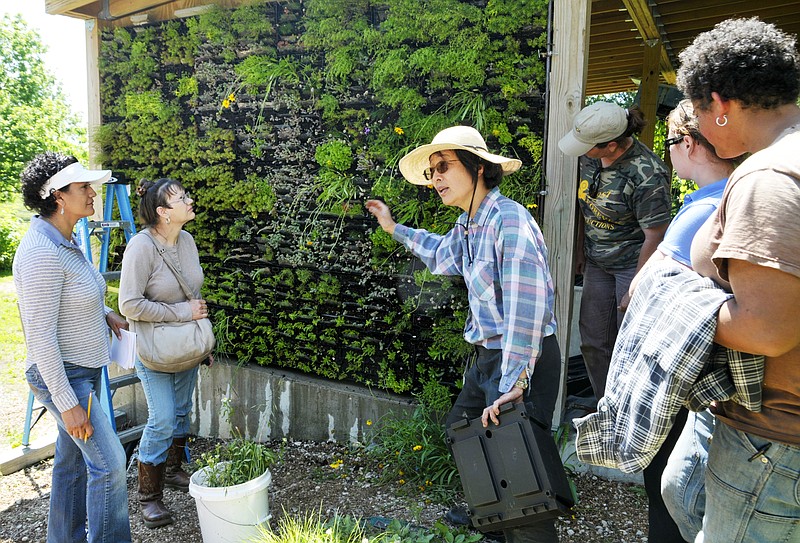To a mixed group of gardeners and farmers, Chris Boeckmann, Lincoln University's organic production manager, explained how he was growing grass hydroponically without soil or much sunlight.
"We take the seed and soak it for 24 hours in a 10 percent bleach solution," he explained. "Every day, we flood and drain (the black plastic pans where the see is sprouting) and add two or three more inches of water."
Once the rye, oats and wheat seeds sprout, livestock eat the grass mats - roots, shoots and all, he said. The key is to feed the spouted grass before mold starts to grow - which happens within a few days.
Boeckmann said other researchers have perfected how to produce a ton of forage per day, but the start-up costs can be $75,000.
"We wanted to do something that might be feasible in a backyard greenhouse or a shed," he said.
And he noted that one of the big advantages of hydroponic growing is that it uses less water than conventional methods.
Boeckmann was one of nine instructors sharing the fruits of their research at Lincoln University's Alternative Field Day, held Monday at the Alan T. Busby Research Farm. The farm is located south of Jefferson City off Goller Road.
Local growers had an opportunity to pick up a few tips on Wednesday at the field day. The event covered a diverse medley of topics, from "silvopasture" - or the practice of combining forestry and domesticated livestock grazing in a mutually beneficial way - to composting, native plants, organic blueberries, solar-powered irrigation and multi-species grazing.
Margot McMillen, who lives in Callaway County, came to glean ideas for her vegetable, lamb, beef and historic wheat farm.
She said the composting stop was "great" and she particularly enjoyed the segment on worm bins, which she could see herself trying. (Worm castings are particularly beneficial for gardening.)
"We already compost horse manure, sawdust and brewery grains," she said.
She said she was curious about Boeckmann's hydroponics experiment, if not exactly interested in trying it herself.
"I believe in soil," she said. "But the hydroponics might be fun to play with, maybe. And if you have animals you want to get through the winter on pasture, it might work."
James Caldwell, an LU assistant professor, explained his work with multi-species grazing - particularly grazing sheep with cows.
He noted his experiments revealed that it works well to graze a mob of sheep on a pasture first - because they will clear it of weeds - and move in a group of cows after to graze. Caldwell said it's a fairly simple way to lessen the necessity to spray for weeds.
"If you don't want to spray, or can't afford it, sheep are a huge benefit," he said.
All of the exhibits were designed to help people who are interesting in finding organic and sustainable solutions to common farming problems. McMillen said she's interested in farming without harming the environment.
"If you really believe you should have a local food system, then you do this stuff," she said.

